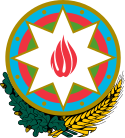| |||||||||||||||||
| Registered | 6,478,840 ( | ||||||||||||||||
|---|---|---|---|---|---|---|---|---|---|---|---|---|---|---|---|---|---|
| Turnout | 76.68% ( | ||||||||||||||||
| |||||||||||||||||
| |||||||||||||||||
 |
|---|
|
|
Presidential elections were held in Azerbaijan on 7 February 2024.[1] Incumbent president Ilham Aliyev, who has held office since 2003, won a fifth consecutive term with over 92% of the vote, defeating his closest runner-up Zahid Oruj, who obtained just 2% of the vote.[2]
Originally planned for October 2025, President Aliyev called for a snap election in December 2023 following the victorious Azerbaijani offensive in Nagorno-Karabakh. This offensive led to the end of the Republic of Artsakh, which was an Armenian-led breakaway state, and Azerbaijan gaining full control over the disputed Nagorno-Karabakh region.[3][4] The election is informally known as the "Victory Election" (Azerbaijani: Zəfər seçkisi) due to the successful military operation.[5][6] It marks the third snap election in Azerbaijan's history and the first to be held in winter season.[7]
The election takes place in an authoritarian context where the opposition and independent media are noted to be repressed in Azerbaijan.[8] The two main opposition parties, Musavat and Popular Front, announced that they would not field candidates for the election and urged voters to stay home, citing the undemocratic nature of the election.[9][10] Furthermore, several candidates featured on the ballot had previously expressed public admiration for Aliyev, resulting in the absence of opposition contenders amidst the crackdown on independent media and journalists.[11][12][13][14][15]
In addition to the aftermath of the Nagorno-Karabakh conflict and its future implications, the election campaign unfolded against a backdrop of broader geopolitical tensions in the region. This included competition between regional powers and efforts to assert Azerbaijan's influence in the South Caucasus.[16][17] Domestic issues such as economic stagnation, rising social inequalities, and concerns about democratic governance were also prominent themes in the election discourse.[18] The Organization for Security and Co-operation in Europe highlighted concerns such as "secrecy of the vote, absence of measures against multiple voting, and signs of ballot stuffing," prompting doubts about the integrity of the ballot counting and reporting process. Observers noted that although election preparations were executed efficiently and competently, genuine pluralism was lacking, with critical viewpoints consistently suppressed.[19][20]
- ^ "Azerbaijan to hold snap presidential election in early February, shortly before Russia's vote". AP News. 7 December 2023. Archived from the original on 8 December 2023. Retrieved 8 December 2023.
- ^ Teslova, Elena (8 February 2024). "President Ilham Aliyev reelected after winning 92% votes in Azerbaijan's election". www.aa.com.tr. Archived from the original on 9 February 2024. Retrieved 13 February 2024.
- ^ "Azerbaijan's Aliyev calls snap presidential elections for February". Al Jazeera. 7 December 2023. Archived from the original on 8 December 2023. Retrieved 8 December 2023.
- ^ "Azerbaijan To Hold Snap Presidential Poll On February 7". RadioFreeEurope/RadioLiberty. 7 December 2023. Archived from the original on 8 December 2023. Retrieved 8 December 2023.
- ^ Məmmədov, Səlim (10 December 2023). "Növbədənkənar seçkilər əsl Zəfər seçkisi olacaq". demokrat.az (in Azerbaijani). Archived from the original on 16 December 2023. Retrieved 30 December 2023.
- ^ ""Növbədənkənar seçkiləri Zəfər seçkiləri adlandırmaq olar" - Arzu Nağıyev". sfera.az (in Azerbaijani). 11 December 2023. Archived from the original on 16 December 2023. Retrieved 30 December 2023.
- ^ Həmidoğlu, Qəzənfər (7 December 2023). "Qışda ilk prezident seçkisi... no problem!". modern.az (in Azerbaijani). Archived from the original on 11 December 2023. Retrieved 9 December 2023.
- ^ "Azerbaijan To Hold Snap Presidential Poll On February 7". RadioFreeEurope/RadioLiberty. Archived from the original on 8 December 2023. Retrieved 8 December 2023.
- ^ "Opposition parties reject Azerbaijan's snap election call as undemocratic". Reuters. 2023.
- ^ "Azerbaijan's top opposition parties to continue election boycott streak". Eurasianet. 2023. Archived from the original on 1 January 2024. Retrieved 1 January 2024.
- ^ "Azerbaijan's Aliyev appears headed to a landslide win in election called after retaking Karabakh". AP News. 7 February 2024. Archived from the original on 7 February 2024. Retrieved 7 February 2024.
- ^ "Azerbaijan election: President Ilham Aliyev wins fifth term". dw.com. 8 February 2024. Archived from the original on 11 February 2024. Retrieved 13 February 2024.
- ^ Sultanova, Aida (8 February 2024). "European monitors says Azerbaijan's election took place in a restrictive environment". AP News. Archived from the original on 8 February 2024. Retrieved 13 February 2024.
- ^ Pegg, David (1 February 2024). "Azerbaijan accused of crackdown on journalists in run-up to election". The Guardian. ISSN 0261-3077. Archived from the original on 11 February 2024. Retrieved 13 February 2024.
- ^ Lozovsky, Ilya (2024). "'Total Control': Azerbaijan's Jails Fill With Journalists and Dissidents as Election Approaches". OCCRP.
- ^ Veliyev, Cavid (17 January 2024). "Azerbaijan's early presidential elections: Preliminary assessment | Opinion". Daily Sabah. Archived from the original on 30 January 2024. Retrieved 13 February 2024.
- ^ Hayrapetyan, Tatevik (29 January 2024). "Azerbaijan's Snap Election: Aliyev's "New Era"". EVN Report. Archived from the original on 14 February 2024. Retrieved 13 February 2024.
- ^ Kucera, Joshua (7 February 2024). "In Presidential Election, Azerbaijan's Government Makes It Clear There Is No Alternative". Radio Free Europe/Radio Liberty. Archived from the original on 11 February 2024. Retrieved 13 February 2024.
- ^ "Poll observers say Azerbaijan presidential vote marred by irregularities". Al Jazeera. 8 February 2024. Archived from the original on 8 February 2024. Retrieved 13 February 2024.
- ^ Mamedov, Elman. "International Observers Brand Azerbaijan Vote 'Not Competitive'". www.barrons.com. Archived from the original on 8 February 2024. Retrieved 13 February 2024.

